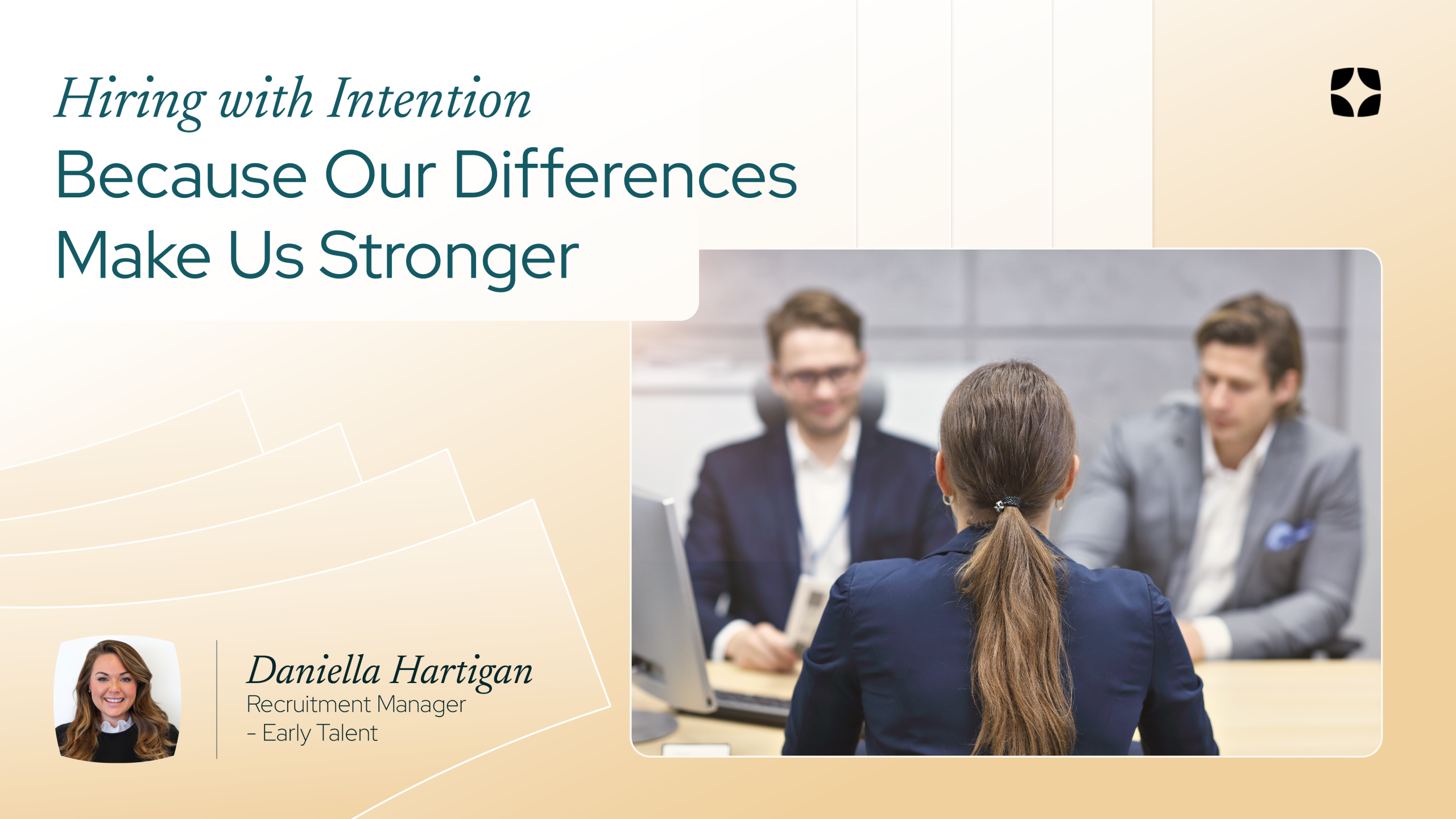The right talent can transform your business—and we make that happen. At Collabera, we go beyond staffing to deliver strategic workforce solutions that drive growth, innovation, and agility. With deep industry expertise, a global talent network, and a people-first approach, we connect you with professionals who don’t just fit the role but elevate your business. Partner with us and build a workforce that powers success.
13
March
Hiring with Intention: Because Our Differences Make Us Stronger
At Collabera, I’ve had the privilege of sitting at the intersection of hiring strategy, cultural advocacy, and operational change. As a Talent Acquisition Leader, I believe the way we build teams can either challenge systems of exclusion or quietly uphold the status quo of “well, it’s worked in the past.”
Hiring is one of the most powerful tools we have to shape company culture. Every decision we make, every job post we write, every screening conversation we have, every time we pause to answer a question directly builds the culture of Collabera—not only internally, but externally to the over 3,500 candidates the Early Talent team screens over the phone or in person every. single. year.
Unfortunately, over the past 5–10 years, DEI efforts in corporate America have often been more performative than reflective of a company’s true values. That’s why at Collabera, we do everything with purpose. Equitable hiring is about more than checking boxes or changing the optics of a curated team photo on LinkedIn. It’s about unlearning what we’ve been taught to value in a candidate. It’s about disrupting the silent biases baked into what we define as “qualified,” “professional,” or “a good fit.”
It’s not about blindly trusting our so-called gut feelings, because when you really dig into what a gut feeling is, it often just reflects comfort with the familiar. That instinct may feel neutral, but it’s shaped by personal experience and cultural norms. And if a hiring manager hasn’t worked in diverse or inclusive environments, their gut may be gatekeeping more than they realize.
I’ve been lucky to work at a company that actively challenges those norms. Through Collabera’s sponsorship, I completed Cornell’s Women’s Leadership Certificate—a deeply meaningful program that changed the way I see my own leadership. One course in particular, Women in Leadership: Navigating the Double Bind, helped name what so many women experience: being labeled too assertive or not assertive enough, too ambitious or not ambitious enough. It helped me recognize how easily those same double standards sneak into hiring decisions.
Over the years, we’ve learned that we see more growth in our organization when we’re hiring people who challenge us—not just mirror us. We need to see potential, not just cookie-cutter polish. We need to make space for candidates with nonlinear paths, caregiving gaps, different communication styles, and life experiences that don’t fit neatly into a LinkedIn summary or a cover letter.
As Vice President Kamala Harris once said: “My mother would look at me and she’d say, ‘Kamala, you may be the first to do many things—but make sure you’re not the last.’” That’s what intentional hiring is about: ensuring the door doesn’t just open once, but stays open—for everyone.
DEI isn’t “nice to have.” It’s doing what should have been done all along. It’s not about better photos or client metrics. It’s leadership. And that’s where we stand as an organization.
Version 2:
Hiring is one of the most powerful tools an organization can use to shape its culture. At Collabera, we treat it as more than a transactional process. We use it to drive growth, define leadership, and build the kind of company we want to become. When hiring is intentional, it demands a different kind of decision-making: one rooted in equity, inclusion, and long-term impact from the very first interaction.
Each year, our Early Talent team connects with more than 3,500 candidates. Every resume they review, every screening conversation they lead, and every decision they make reflects who we are and what we value. We don’t focus on the most polished story on paper. We focus on recognizing potential in all its forms and creating a process that expands access instead of limiting it.
Across industries, too many DEI efforts look impressive in theory but fail to deliver meaningful change. At Collabera, we take a different approach. We hire with intention by questioning the standards the corporate world has long rewarded. We ask whether labels like “qualified,” “professional,” or “culture fit” help us identify talent—or simply protect the status quo. Often, these words reflect inherited bias, not objective assessment.
Even gut instincts deserve examination. Many of us trust our intuition in interviews, but that instinct often mirrors what feels familiar. And familiarity isn’t neutral. It reflects the rooms we’ve been in, the people we’ve seen succeed, and the models we’ve been taught to trust. Without awareness, that comfort can quietly close doors we never meant to shut.
That’s why we’ve equipped Collabera leaders with tools to think and see differently. Through programs like the Cornell Women in Leadership Certificate, our team explores the structural barriers many candidates face before they even get in the door. These programs don’t just inform, they transform. They spark new habits, challenge old thinking, and reshape how we evaluate potential at every stage.
We’ve learned that growth happens when we build teams around difference, not similarity. That’s why we pursue candidates with unconventional career paths. We take the time to ask what shaped a gap on a resume, instead of overlooking it. We value those who speak, solve, and lead in ways that fall outside traditional expectations, because that’s where innovation lives.
Real change doesn’t start with one hire. It starts with a mindset that keeps the door open for everyone who follows. The goal isn’t to be the first but rather to make sure you’re not the last.
At Collabera, DEI isn’t a “nice to have.” It’s doing what should have been done all along. It’s not about better photos or stronger talking points. It’s about leadership. And the way we hire sends one of the clearest signals about the future we’re working to create.


